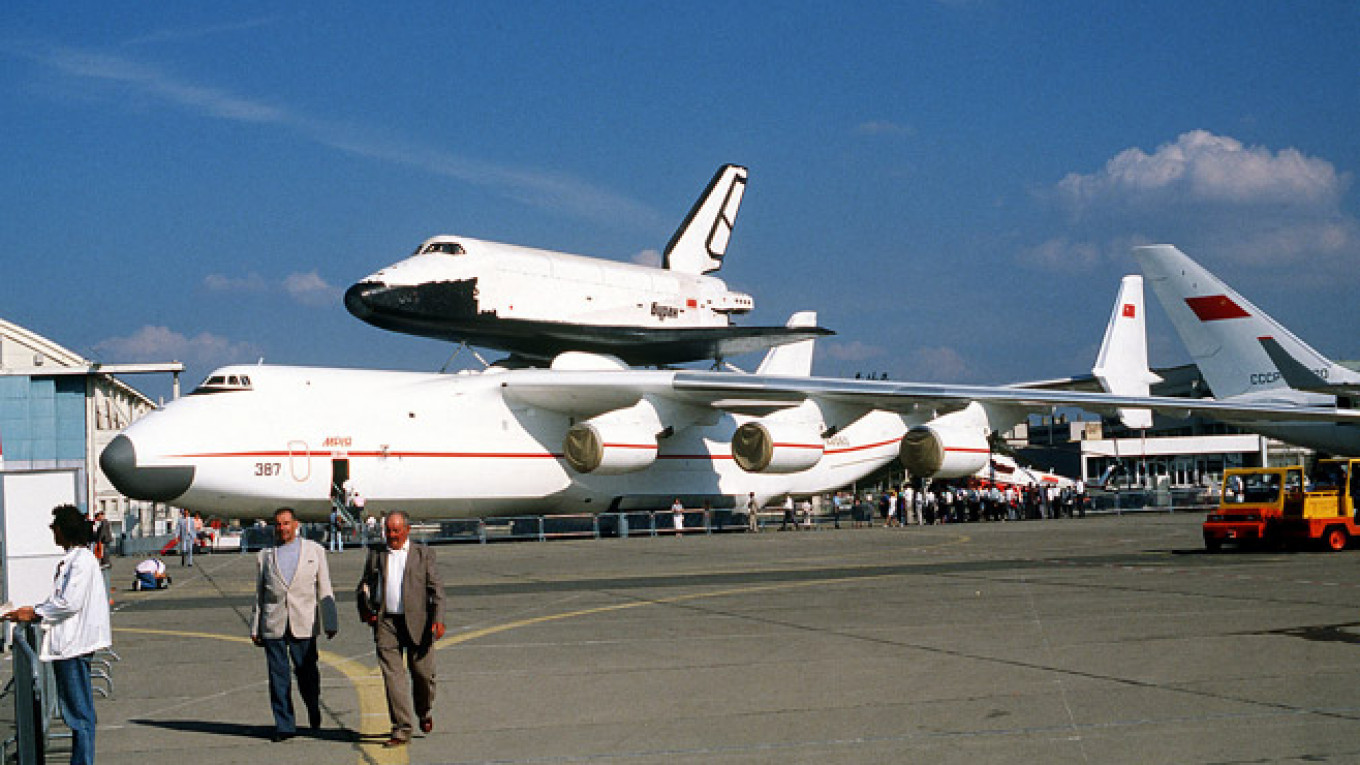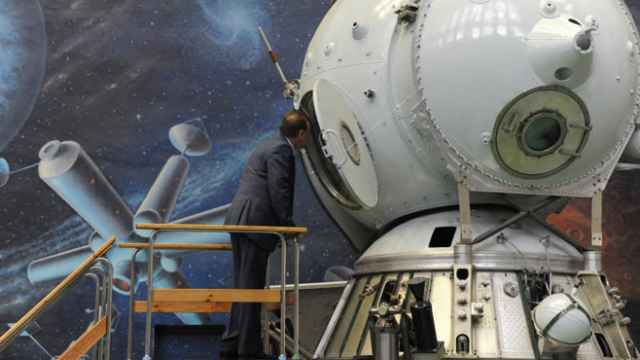Russia's space industry, despite an imminent government shake up that will force firms to justify their budgets, is struggling to come up with new plans as engineers cling to designs from their Soviet glory days, experts said.
Paralyzed by a sudden shift from lavish funding by the Soviet regime to a near void of state support in the 1990s, Russia's space industry has at once been unable restructure its scientific and technological base to allow for new ideas to flourish, and has failed to attract new talent.
Now, 20 years on, "space industry managers and officials understand that they are incapable of advancing the level of technology within the current economic and institutional framework," said Pavel Luzin, a space policy analyst at the Perm State University.
These trends explain proposals such as one made earlier this month by the Progress Rocket and Space Center in Samara, which proposed a revamp of the venerable Soyuz rocket it first introduced in 1966.
The Soyuz-5 "reflects the overall tendency in the Russian space industry to continue endlessly improving and modifying the old Soviet space hardware instead of developing radically new technologies," said Yury Karash, a space policy expert with the Russian Academy of Cosmonautics.
In a legacy of the Soviet era, Russia's three largest space companies, RSC Energia, the Khrunichev Space Center, and the Progress space center in Samara, also tend to simply duplicate one another's work or stretch the lifetime of Soviet-era designs by selling them on the commercial market.
Progress's design for the its new rocket, the Soyuz-5, looks a lot like Russia's newest rocket — the Angara, a design begun in the early 1990s that underwent a number of design changes before finally flying for the first time last year.
Angara, while technically the first new rocket built by Russia since the fall of the Soviet Union, features several classic Soviet-era components.
Igor Lissov of Russia's space-focused Novosti Kosmonavtiki journal sees the ongoing reconsideration of the Federal Space Program for 2016-2025 as the reason behind these Soviet and 1990s-era "resurfacings."
The program was supposed to be approved last year, but a massive industry reform plan adopted by President Vladimir Putin last month has forced space officials to rework the entire proposal in light of Russia's actual capabilities in space and funding reality after the Russian currency lost half its value last year.
This has prompted companies such as Progress, and to some extent Energia, to launch a flurry of rehashed plans in a bid to stay relevant as the government considers the extent to which it will continue to fund space activities in the face of Western sanctions and falling oil prices.
It may not be the best tactic, since some of the proposals overlap, have been rejected before, or fail to promise any meaningful innovation in Russian space technology.
"Perhaps they are counting on the short memories of government officials," said Dr. James Oberg, a former NASA engineer and a prolific chronicler of Russian space efforts.
The Moscow Times has taken a look at some of the proposals from these prominent organizations.
Soyuz-5
The Progress Rocket and Space Center, builder of the esteemed Soyuz rocket, has had bad luck trying to get the government to fund a new rocket project to completion.
Last week it said it would submit a proposal to the government for a new rocket known as Soyuz-5.
This proposal is essentially a reformulation of Progress's Rus-M rocket, which mirrored the capabilities of Khrunichev's Angara rocket. Because of this, Roscosmos cancelled funding for Rus-M in 2013.
Soyuz-5, for example, will be a modular rocket like Angara — meaning it increases its payload capacity by strapping on identical booster rockets to the side of the main rocket.
It also uses environmentally friendly fuel, which has become a selling point to Russian space officials after some nasty incidents with the venerable Proton rocket's highly toxic fuel.
Like the Rus-M, it is perhaps too similar to Angara to win on its own merits.
The Energia Rocket
RSC Energia, Russia's largest space corporation, is trying to revive an old project based on the Soviet super-heavy Energia booster, which flew a handful of times during the twilight days of the Soviet Union.
Energia was the crowning achievement of the Soviet space age, and would have been the world's largest rocket even today had the project not been unceremoniously scrapped in the early 1990s in a desperate bid to save the rest of the space program during a merciless budget squeeze.
The idea of reviving Energia has resurfaced a number of times under Putin as the space industry's funding situation improved.
Most recently, the idea found favor with former Roscosmos space agency chief Oleg Ostapenko, who was fired last month. He floated the idea himself in a December 2012 press conference devoted to industry reform plans and future goals.
New Space Station
According to Luzin, the goal of Russia's state enterprises is the same as those in any other strategically important industry — to extract as much money from the federal budget as possible before the well dries up.
This might explain another rehash — a new national space station, which would be built on the foundation of the Russian segment of the current International Space Station (ISS).
The Soviet-era Mir space station was a huge point of pride for Russians well into the 1990s, and when the station was deorbited in 2001, it was cause for national dismay.
Russia had wanted to build a Mir-2, but the components that were intended for the station were used to construct the Russian segment of the ISS.
Given that Russia has not seen any breakthroughs in its launch capacity or space station design, it is hard to see what it would gain from a new space station other than the feelings of national pride induced by the Mir space station.
Plans to throw together an all-Russian space station resurfaced last November, when Roscosmos's in-house think tank, TsNIIMash, leaked a proposal resembling the Orbital Piloted Assembly and Experiment Complex, an idea that was first introduced publicly in 2004.
Such a station, justified largely as a national prestige project, would likely appeal to government officials and secure a long running stream of state funding to build and operate a new Russian space station.
Golden Age Lost
But the biggest problem with these initiatives might not be their failure to innovate, but their dependence on a society that no longer exists.
No matter which grand proposals are brought out of storage, NASA's Oberg is skeptical that Soviet plans will revive the Russian space program because the factors under which the Soviet-trained space community flourished is long gone.
"These include recruitment of the country's finest minds, providing them with special privileges, assigning them challenging tasks, allocating them the finest resources in abundance, and rewarding them with international acclaim and professional satisfaction," he explained.
Without this, "the companies will continue to propose everything they have in their stores," said Luzin. And with the future of space gradually being defined by commercial entities — from SpaceX to Virgin Galactic — Russia may find itself treading water in the coming years.
Contact the author at [email protected]
A Message from The Moscow Times:
Dear readers,
We are facing unprecedented challenges. Russia's Prosecutor General's Office has designated The Moscow Times as an "undesirable" organization, criminalizing our work and putting our staff at risk of prosecution. This follows our earlier unjust labeling as a "foreign agent."
These actions are direct attempts to silence independent journalism in Russia. The authorities claim our work "discredits the decisions of the Russian leadership." We see things differently: we strive to provide accurate, unbiased reporting on Russia.
We, the journalists of The Moscow Times, refuse to be silenced. But to continue our work, we need your help.
Your support, no matter how small, makes a world of difference. If you can, please support us monthly starting from just $2. It's quick to set up, and every contribution makes a significant impact.
By supporting The Moscow Times, you're defending open, independent journalism in the face of repression. Thank you for standing with us.
Remind me later.






